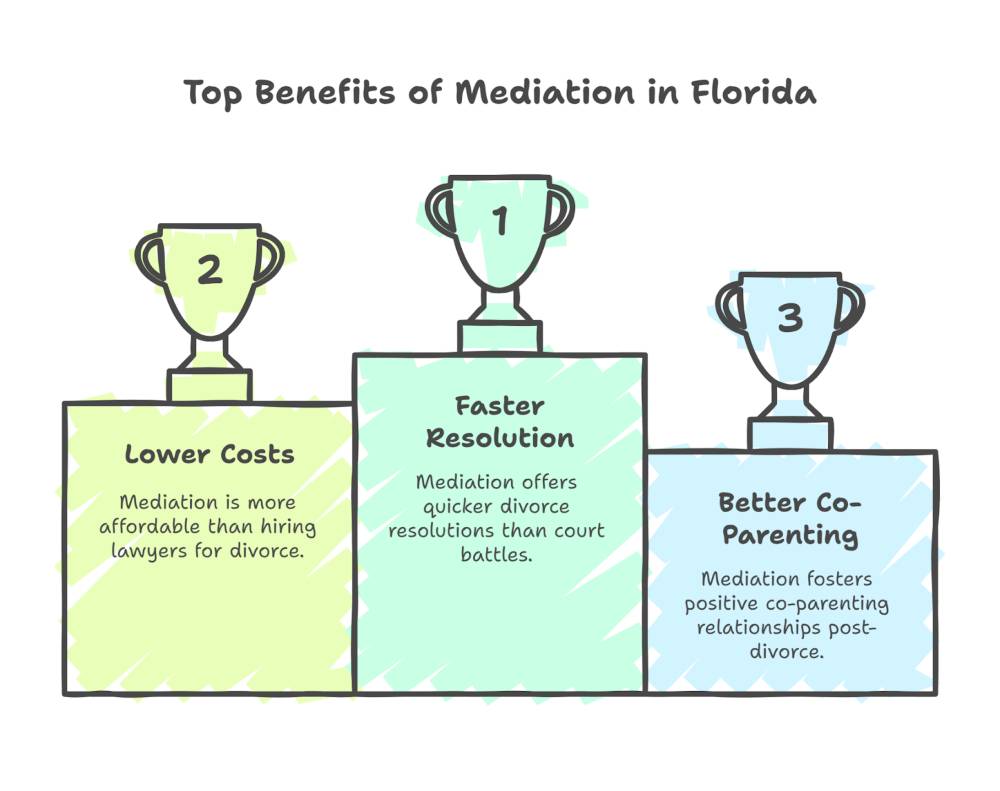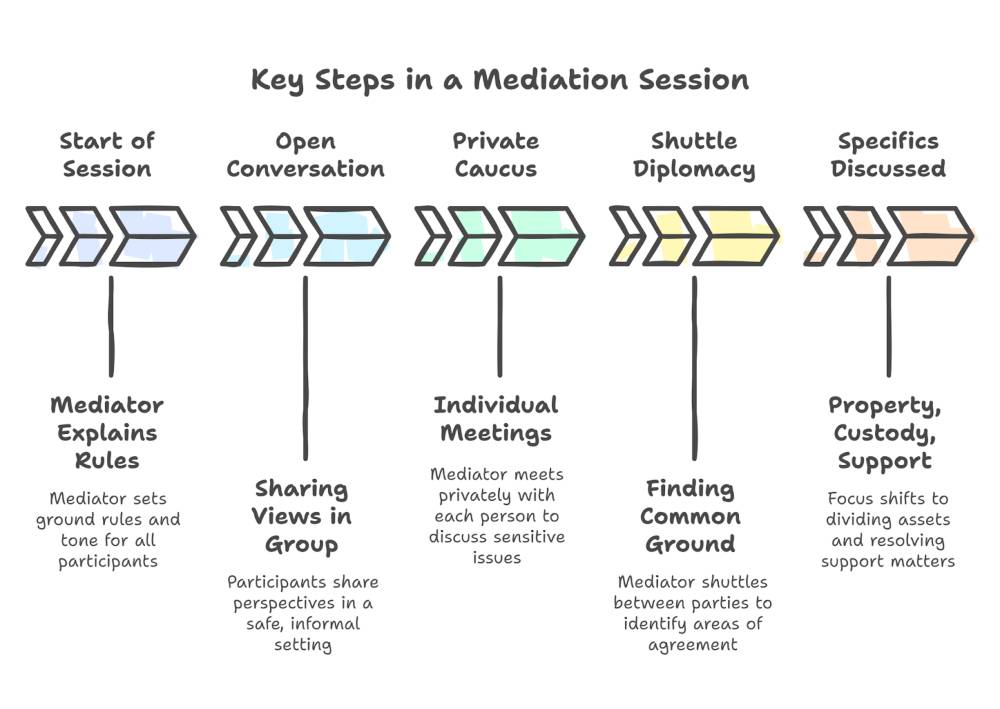
Why Florida Couples Are Turning to Mediation for Healthier, More Affordable Resolutions

Nowadays, more and more couples in Florida are searching for a smoother, less stressful way to handle divorce.
People are noticing the advantages of mediation, which can help them reach fair agreements without the mess of long courtroom battles.
Couples choose mediation because it gives them privacy, saves money, and offers more control over the outcome than going to court.
Recent changes in Florida laws have made mediation more attractive and accessible. The process encourages respectful conversations and supports parents as they plan for their family’s future.
Mediation helps couples handle divorce in a way that’s more personal and less damaging to relationships.
Key Takeaways
- Mediation is becoming a popular choice for divorce in Florida.
- The process helps couples communicate and save money.
- Mediation gives families more say in their future.
A Shift In How Florida Couples Divorce

More couples in Florida are picking divorce mediation instead of fighting it out in court. Mediation allows families to talk things through with a neutral person who helps them find common ground.
People are making this switch to save time and money. Mediated divorces often move quicker and cost less than dragging things through court.
Mediation is private, so nobody’s airing personal business in public. That privacy can be a relief, especially when kids are involved.
Florida’s laws will makesmoother uncontested divorce mediation even easier in 2025. New rules aim to make uncontested divorce with mediation in Florida so couples can settle important matters without so much conflict.
These updates are nudging more people away from the courtroom and toward mediated agreements.
Here’s a simple comparison:
| Mediation | Court Divorce | |
| Cost | Lower | Higher |
| Speed | Faster | Slower |
| Privacy | Private | Public |
| Control | More for couples | Less for couples |
The Post-COVID Divorce Landscape
Florida couples have seen some big changes in how divorces work since COVID-19. Restrictions during the pandemic pushed many people to look for alternatives to court.
Mediation became the go-to because it let couples meet online and skip crowded courtrooms. A major shift is the rise of virtual divorce mediation.
Even after the pandemic, plenty of couples still choose to handle their divorces through video calls or online platforms. It’s just easier for busy people or those living in different places.
Key reasons couples choose mediation after COVID-19:
- More privacy and less stress
- Flexible scheduling, including virtual meetings
- Cost savings compared to courtroom battles
Studies show that the marriage and divorce rates in Florida have dropped since 2010. The old idea of a 50% divorce rate is out of date.
Recent studies say fewer people get divorced each year, and more are looking for peaceful solutions like mediation.
| Benefits of Mediation | How It Helps Couples |
| Privacy | Keeps matters out of court |
| Lower Costs | Saves money on legal fees |
| Flexible Scheduling | Fits busy lives |
| Control Over Outcomes | Let couples make decisions |
People are also exploring other peaceful options like collaborative divorce. Both mediation and collaborative divorce give couples more control over the process and help them avoid a trial.
What Makes Florida Divorce Mediation Different
Divorce mediation in Florida has its own rules and procedures. Couples can expect special standards for mediators and clear guidelines that shape how disputes get handled.
Florida’s Mandatory Mediation Rules
Florida courts usually require divorcing couples to try mediation before a trial. This is called court-ordered mediation.
The main goal is to help both people reach agreements on issues like parenting, dividing property, and finances. Mediation in Florida is designed to save time, lower stress, and avoid expensive court fights.
Most counties require mediation in family cases unless there’s a history of domestic violence or some other strong reason to skip it. Couples sit down, often in separate rooms, while a neutral mediator guides the process.
The parties, not a judge, make the important decisions.
Certified Family Mediators In Florida
Florida sets strict requirements for becoming a certified family mediator. Mediators have to complete a state-approved training program and pass background checks.
They also need a certain amount of professional experience. Certified family mediators in Florida understand the law and how to handle conflict.
Their job is to keep talks calm and productive while ensuring both parties have a say. All mediators must follow a clear code of ethics during every session.
Their training helps them handle sensitive topics, like child custody and dividing assets.
Couples can trust Florida’s certified family mediators to help them work toward fair agreements thanks to these requirements.
The Role Of A Non-Attorney Mediator
Not every mediator in Florida is a lawyer. Many certified mediators come from counseling, social work, or business backgrounds.
They still have to finish Florida’s training to handle family disputes. A non-attorney mediator helps couples communicate, listen, and make decisions without giving legal advice.
Their focus is on agreement and understanding, not taking sides. This can make the process less intimidating and more approachable than a courtroom.
Non-attorney mediators use their skills to create a calm setting. Their neutrality can build trust and encourage open discussion during court-ordered mediation in Florida.
Top Reasons Couples Choose Mediation In Florida

In Florida, couples pick mediation because it’s faster, costs less, and can make parenting after divorce easier. People want peaceful solutions, privacy, and to avoid courtroom battles that just add stress.
Faster Resolution Times
Many couples find that mediation helps them resolve divorce issues faster than dragging things out in court. In mediation, most people can set appointments within days or weeks.
Court dates might take months. Florida mediation services usually focus on direct conversations.
Both parties sit down with a trained neutral person and talk through disagreements. This leads to agreements on things like property, support, and time-sharing.
Sessions are private and controlled, without waiting on a judge’s busy schedule. Choosing mediation over court means people can take control of the pace and avoid feeling stuck.
This is why many like the idea of an amicable divorce in Florida, since it allows them to move forward sooner.
Lower Costs Than Hiring Lawyers
Mediation is usually much less expensive than fighting in court with lawyers. While hiring attorneys can come with high hourly fees, some families use flat-fee mediation in Florida for a simple price.
A typical contested divorce with lawyers can cost thousands, especially if there are many issues or multiple court sessions. Mediation costs less because sessions are shorter and less formal.
Many people want a divorce without a lawyer in Florida to avoid extra costs.
Family mediation Florida options also lower legal expenses, so couples can use the money for new housing, kids, or other needs instead of attorney fees.
Better Long-Term Co-Parenting Outcomes
Mediation can support good co-parenting by encouraging open conversation and agreement on important matters.
Instead of fighting in front of a judge, parents discuss what works best for their kids with a mediator’s help.
Studies show that when parents help create their agreements, they’re more likely to stick to the plan. This makes life more stable for children.
Florida mediation services also work to keep both parents involved in raising their kids when possible.
The best divorce mediators in Florida help families reduce anger and frustration by focusing on solving problems instead of blaming each other.
This approach lays the groundwork for a better relationship between parents after the divorce.
More Florida couples are choosing mediation for a calmer divorce. Peacemaker Mediation Group helps you avoid court chaos and move forward with confidence. Contact us to schedule your private session today.
If you’re ready to get started, call us now!
What Happens In A Typical Mediation Session?

Mediation is a step-by-step process to help Florida couples resolve their divorce issues. Each session aims to keep conversations respectful, productive, and focused on agreements that work for both sides.
Before You Begin: What To Prepare
Before mediation, both parties need to gather documents and consider their goals. Important items include pay stubs, tax returns, proof of assets and debts, and any child-related records.
Organized paperwork saves time and avoids confusion. Couples should also jot down their main questions or concerns, maybe about property, custody, or support.
It’s helpful to talk to a family law attorney first, though it’s not required. Many choose to meet privately with the mediator before the session starts.
This meeting allows each person to share concerns and explain what they want from the process. It also helps the mediator understand the situation and plan for a smoother session.
The Step-By-Step Flow Of A Mediation Session
Mediation starts with everyone meeting together in one room—either face-to-face or over video. The mediator, who stays neutral, explains the rules and sets the tone.
Their job is to help both people feel heard and safe enough to share their views. Sessions tend to be informal, aiming for open conversation over confrontation.
At some point, the mediator might meet privately with each person. This step, called a caucus, lets each side speak more freely about what’s bothering them.
The mediator exchanges information, looking for common ground. It’s a bit like shuttle diplomacy—sometimes slow, but it works.
Most of the talk centers on specifics: dividing property, debts, custody, and support. Private meetings help people bring up sensitive stuff without feeling exposed.
Final Outcome: The Marital Settlement Agreement (MSA)
If the couple finds agreement on everything, they put those decisions into a Marital Settlement Agreement (MSA). This document outlines what they decided about property, finances, and parenting plans.
Both people review and sign the MSA. It’s a big moment—sometimes a relief, sometimes bittersweet.
They file the MSA with the court as part of the divorce process. After a judge reviews it, the agreement becomes part of the final divorce order.
Once the MSA is completed, a mediated divorce in Florida usually wraps up faster and with less stress. It’s also often easier and more affordable to file.
If some unresolved issues, the couple can let a judge decide those parts. But most couples work out at least a partial settlement through mediation.
Financial And Emotional Benefits Of Mediation
Mediation gives couples a practical way to handle divorce and custody without dragging things through court.
Many Florida couples notice less stress, lower costs, and better family relationships when they try it.
Save Thousands In Legal Fees
Divorce litigation in Florida gets expensive quickly. Couples who go to court might spend thousands on lawyers, court fees, and other expenses.
Mediation almost always costs less because both people work with one neutral mediator and often finish the process sooner. That alone can be a huge relief.
Families often see that the cost of divorce mediation in Florida is much lower than a traditional courtroom battle. Fewer hours, fewer bills.
Some estimates show savings of over 50% compared to litigation. That’s no small change.
Here’s a quick comparison table to show how much your wallet could feel it:
| Process | Average Time | Typical Cost Range |
| Mediation | 2-6 months | $2,000 – $5,000 |
| Court Litigation | 6-18 months | $10,000 – $30,000 or more |
Mediation also helps you avoid hidden expenses like missed work or extra childcare. That keeps more money in your pocket for your kids or your next chapter.
Preserve Family Relationships During & After Divorce
Emotional tension can skyrocket during courtroom divorces. Mediation, on the other hand, gives both sides a real chance to talk honestly and respectfully.
This often leads to more cooperation and less bitterness. Open discussion helps both parents stay involved in their child’s life, which can make a huge difference for everyone.
With child custody mediation in Florida, parents work together to create a parenting plan that fits their family. There’s less risk of one parent feeling left out or ignored.
When families leave mediation, they often feel like a team than rivals. That makes graduations, holidays, and even random Tuesdays easier for everyone.
Reduce Emotional Burnout For Children
Kids feel divorce deeply. Courtroom battles usually bring more stress, confusion, and worry into their lives.
Mediation helps keep the conflict out of the spotlight. Children see their parents working together instead of fighting, and that matters.
Many parents notice fewer behavior problems and less anxiety in their children when they choose mediation. Studies show that kids adjust faster to new routines when they aren’t exposed to constant conflict.
By putting the child’s needs first and shaping parenting agreements in a calmer setting, mediation helps children feel safer during big family changes.
Mediation saves time, money, and emotional strain. If you want to divorce without destroying your peace, Peacemaker Mediation Group can help. Book your confidential mediation consultation now.
If you’re ready to get started, call us now!
Mediation Vs. Traditional Divorce: A Clear Comparison
Mediation and traditional divorce offer very different experiences for couples splitting up. People weigh their options based on speed, cost, emotional needs, privacy, and how much control they want over the outcome.
Time To Completion
Most couples find mediation moves much faster than traditional divorce. Mediated settlements can sometimes happen in just a few weeks or months, depending on how much both sides agree.
Traditional divorce cases—especially when they end up in court—drag on much longer. Six months, a year, or more isn’t unusual if there are big disagreements.
Mediation lets both sides schedule meetings when it works for them. In court-based divorces, everyone waits for a judge’s schedule, which can be booked up for months.
This flexibility is one reason more people are checking out divorce alternatives in Florida.
Legal Costs
Legal costs tend to drop with mediation. Many people don’t hire attorneys for every step of the process, while traditional divorce almost always means lawyers on both sides.
Attorney fees and court costs in a contested divorce can pile up quickly, sometimes to tens of thousands of dollars. Mediation is often a cost-effective way to separate because you may only pay the mediator and filing fees.
Some couples even split the mediator’s fee, making it more affordable. Less conflict and fewer meetings keep the total bill lower than a long court fight.
Privacy And Emotional Impact
Privacy is a huge reason couples try divorce mediation vs litigation. Mediation happens in private, not in an open courtroom.
The discussions and agreements usually stay confidential. Traditional divorce cases, though, create public records—details about assets, parenting, and arguments can end up on file for anyone to see.
This can feel uncomfortable and add stress. Mediation is usually less upsetting emotionally, too. The goal is to work together for solutions, which means less arguing and more focus on the future.
Control Over The Outcome
Mediation gives both people a real say in what happens next. The couple works with the mediator to create their own agreement about money, parenting, and property.
In a traditional divorce, the judge decides if the couple can’t agree. Sometimes, neither side likes the result, but they still have to live with it.
By choosing mediation, couples keep more power over their own lives. They can talk about what matters most and reach a solution that fits their family. That level of control is a big reason mediation keeps gaining ground among Florida families.
Who Mediation Works Best For (And When It Doesn’t)
Mediation is often a practical choice in Florida divorces, letting couples settle differences outside the courtroom. But it isn’t the right fit for every situation.
Ideal Couples For Mediation
Couples who handle disagreements with respect and are open to compromise usually do well in mediation. It’s most effective when both people want to avoid a court fight and are willing to cooperate.
Mediation benefits spouses who:
- Share a basic level of trust
- Have balanced communication
- Want to resolve things quickly
- Need to save on legal fees
- Prefer a private, less formal setting
Mediation really helps when there are kids, since it often means less stress for everyone. Both spouses can even bring their lawyers for advice if they want, but it’s still not as formal as a court. In many Florida divorces, mediation saves time, money, and stress.
Red Flags: When Litigation May Be Necessary
Mediation isn’t for everyone. If there’s abuse, intimidation, or a big power imbalance, it may not be safe or fair.
A history of violence, substance abuse, or threats is a sign that a judge should step in. Here are some signs that point to litigation:
- One spouse controls all finances
- Fear or threat of harm
- Communication always breaks down
- Accusations of child abuse or neglect
- One party refuses to cooperate
In these situations, mediation can’t work because it relies on honest discussion and shared trust. Some experts in Florida don’t recommend mediation when basic cooperation and safety are missing.
Can One Spouse Refuse Mediation In Florida?
Florida law doesn’t require mediation in every divorce, but courts in many counties often order it before a case moves to trial.
If a judge orders mediation and one spouse refuses, the court might delay the case or take other action.
Refusing can lead to:
- Extra legal costs
- Possible court penalties
- A longer divorce process
There are exceptions, like cases involving domestic violence, where the court can excuse a spouse from mediation.
Many Florida couples pick mediation because it gives them more say over big decisions.
This process lets both sides actually work together, not just battle it out in court.
Mediation usually lowers stress and helps couples protect their privacy.
The meetings stay confidential, which keeps personal stuff out of the spotlight.
Major Benefits:
- Saves money compared to court
- Speeds up the divorce process
- Lessens emotional strain
- Encourages better communication
Virtual mediation’s become a lot more common lately.
Couples can meet with a mediator online, which makes scheduling less of a headache and cuts out travel time.
This option really helps families who live in different places. Mediation isn’t just about splitting up assets.
It also helps parents keep their focus on what’s best for their kids. Plenty of families say they feel more satisfied with the outcome when they go this route.
In lots of cases, mediation gives families a shot at a smoother transition into whatever’s next.
Ready to resolve your divorce outside of court? Peacemaker Mediation Group offers guided, flat-fee mediation for Florida couples seeking clarity and closure. Contact us to begin your path to peace today.
Contact Us Today For An Appointment
Frequently Asked Questions
Why is mediation becoming popular in Florida divorces?
Florida couples prefer mediation for its speed, lower costs, and cooperative tone. Courts often encourage or require it before allowing a trial.
Is mediation mandatory in Florida divorce cases?
Yes, in many counties. Florida courts typically require mediation in contested family law matters before setting a trial date.
How much does divorce mediation cost in Florida?
Mediation in Florida typically ranges from $1,500 to $5,000—far less than traditional litigation, which can exceed $13,000 per spouse.
How long does a mediated divorce take in Florida?
A mediated divorce in Florida often takes 2 to 3 months, depending on court availability and the couple’s level of agreement.
What issues are resolved in divorce mediation?
Common issues include parenting plans, time-sharing, property division, child support, and alimony—everything needed for a Marital Settlement Agreement.
Can mediation be done virtually in Florida?
Yes. Many mediators, including Peacemaker Mediation Group, offer remote sessions via Zoom, making the process more convenient and confidential.
Does mediation always work in divorce cases?
No. If spouses are unwilling to cooperate or if abuse is involved, litigation may be the better path. Mediation relies on voluntary participation.




